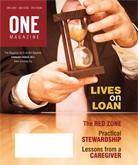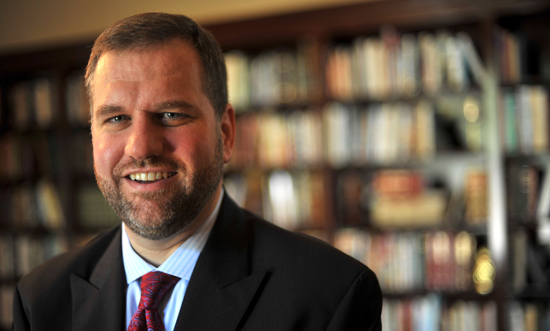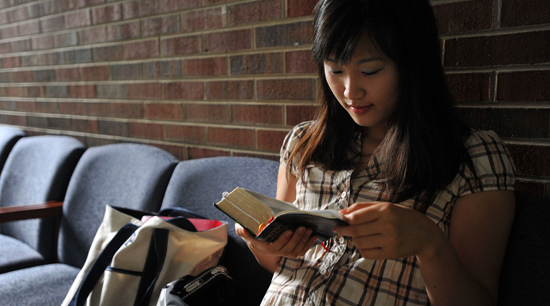
February-
March 2011
Lives on Loan:
The Importance of Christian Stewardship
E-Reader
----------------------
|

Matt Pinson, president of Free Will Baptist Bible College (pictured above), responds to questions about the institution's possible name change to Welch College and the effect it may have on students, the denomination, alumni, and the future.
A College by Any Other Name...
Does a name change indicate a change in mission, philosophy, or purpose?
Absolutely not! The college will continue its conservative, Bible college philosophy of education, with a major in Bible (at least 30 hours of Bible for every student); required participation in daily chapel, dorm small group devotions, and Christian service and church attendance; and an emphasis on the student’s role in local church ministry/leadership and missions. We want to carefully safeguard our Bible college philosophy of education and our conservative Free Will Baptist heritage and theology. We simply want to expand the reach of that mission to more Free Will Baptist students.
Why change the name after almost 70 years?
We want to help stop the drain of Free Will Baptist leadership out of the denomination and out of Christianity. Things are different than they were even a few decades ago. Secular colleges and universities are increasingly hostile to Christian faith and morality. Most Free Will Baptist college-age students attend secular schools; a few attend non-Free Will Baptist Christian colleges; most of them leave our denomination during or after college.
The college has always embraced an “umbrella” approach to Bible college education—seeing non-ministry majors and careers as noble endeavors for Christian students. The past four decades have witnessed FWBBC moving to a more comprehensive Christian college offering 40 programs of study. Yet, most Free Will Baptists see FWBBC as a “ministry-only” college. Despite our accreditation and rankings, we cannot shake that perception, no matter how hard we try. And we’re told again and again by our own people, it’s because of our name.
Consider these statistics:
-
About 52 percent of Bible-believing Christians who enter a secular college or university list “no church attendance” after graduation.
-
About 80 percent of Free Will Baptist college-age students attend secular colleges.
-
About 10 percent of Free Will Baptist college-age students attend non-Free Will Baptist Christian colleges.
These are startling statistics. A few decades ago, fewer Free Will Baptists attended college, and secular institutions were not as hostile to the Christian faith. But if the stats are correct, 40 percent of Free Will Baptist college-age students will list “no church attendance” after graduation—not simply leaving the Free Will Baptist denomination, but dropping out of church altogether. In contrast, statistics show that more than 95% of students who attend evangelical Christian colleges still attend church and adhere to Christian faith and morals after graduation. Of the 10 percent of Free Will Baptist college-age students who do attend non-FWB Christian colleges, most leave the denomination.

Young people aren’t answering the call to ministry in their teens like they used to. Many of our brightest, spiritually minded students feel called to highly competitive professional fields and choose non-FWB colleges. Then they are lost to the denomination.
With the rising cost of college education, FWB students (and parents) want a degree that will help them succeed in their chosen profession. But historically, 50 percent of college students change majors after starting college. Many students who attend Christian colleges answer God’s call and change their major to ministry. This happens because they are in an environment in which they are daily confronted with the call of God on their lives—something that simply doesn’t happen at a secular college or university. The problem is getting students into this Christian environment in the first place.
So when bright, godly, Free Will Baptist students go to non-FWB colleges to pursue highly competitive professional careers, three things happen:
-
We lose top lay leaders out of our churches, young people in whom our churches have invested their lives and prayers.
-
We deprive young people of the opportunity to be in an environment where they would daily be challenged to answer God’s call, and be more likely to answer the call to full-time Christian vocations.
-
We lose young people to the cause of Christ.
Another important reason to consider a name change is that, in a post-9/11 world, it’s increasingly difficult for graduates from a college with a religious name to enter a closed or restricted access country to do evangelistic work.
Also, plans call for FWBBC to expand beyond an undergraduate education. We plan to start a theological seminary and a graduate college of education, and other graduate colleges as well. So, regardless of what our undergraduate program is like, we will not be simply “Free Will Baptist Bible College.”

The time is ripe for the National Association of Free Will Baptists to have its own comprehensive college or university. A college similar in structure to Bob Jones University or Liberty University would allow Free Will Baptist students to attend and not be concerned about getting into a competitive business school, medical school, law school, or other graduate or professional school.
Given the above facts:
-
We are cutting off access to a conservative, Christian, Free Will Baptist education to thousands of FWB young people.
-
We are losing thousands of young people from the denomination.
-
We are finding that most of those who attend other Christian colleges join other denominations.
-
We are losing half the Free Will Baptists who attend secular colleges from the church and the Christian faith.
A name change will accomplish the following:
-
Help stop the loss of solid Christian lay leaders from our denomination.
-
Put more spiritually serious FWB young people into an environment where they can be exposed to the call of God on their lives.
-
Keep more FWB young people out of secular universities where the enemy is stealing their souls.
-
Provide our students entrance into competitive professional/graduate programs and careers.
-
Put more lay leaders into local FWB churches who can also serve as salt-and-light witnesses in professional career fields.
-
Give young people more opportunities to go into closed and restricted access countries to evangelize the lost.
What is wrong with the name we have?
Nothing is wrong with the name we have. It has served us well, and we are proud of it. There is also nothing wrong with a college whose sole mission is ministry training. But we sense that most Free Will Baptists believe that, in an increasingly secularized and fast-changing educational environment, the National Association of Free Will Baptists should not be the only mid-size denomination that does not have comprehensive education for its laity.
Our desire is to stop the perception that Free Will Baptist students called to secular professions should go elsewhere for undergraduate education. Thus, we feel the need to consider this change seriously.
I recently spoke with a family whose son had applied to FWBBC and was considering enrolling. But he felt God leading him to medical school, and he chose another Christian institution for his pre-med training. I nearly wept as he and his father told me, “Brother Pinson, we love FWBBC. We love our denomination. But medical schools are so competitive that we just don’t think an FWBBC degree would give Billy (not his real name) the chance he needs at getting into med school. It seems like poor stewardship to spend $80,000 on an FWBBC degree when God has called Billy to be a godly Christian doctor and, because of the name, going to FWBBC will make it harder to get into medical school.”
My staff and I hear stories like this constantly—not just regarding medical school, but other graduate and professional programs that are gateways to the professions. And it saddens us, because these students are our best and brightest, godly laypeople that our Free Will Baptist churches have poured their lives into training for Christian service and lay leadership. But they almost always leave the denomination when they attend a college of another denomination or a public university.
Why not name the school after Dr. L. C. Johnson, the founding president?
“Johnson,” the name of our founding president, Dr. L. C. Johnson, was of course the first name we considered. Yet that was, sadly, unworkable. We consulted with two attorneys who have broad experience in trademark law. The attorneys researched using Johnson in our college name. They said it was highly unlikely it would hold up in court, because for the past 100 years, Johnson Bible College has been just three hours down the road, in our same state, athletic association, and accrediting organizations. We would almost certainly be sued and almost certainly lose that lawsuit. Further, it would be uncharitable on our part to do this to a fellow Bible college, and it would be confusing and difficult to market.
“Johnson and Welch” would be equally problematic, because of another school named “Johnson and Wales.” One of the attorneys said no judge would uphold our use of these names when these other colleges are so close to us in mission and purpose as undergraduate colleges.
Who is John Welch, and why use his name?
If we cannot name the college after its founding president, it would not make sense to name it after a subsequent president or faculty member. Then someone suggested Welch College after John L Welch and his wife Mary. Both cast long shadows over Free Will Baptist Bible College. John Welch was one of the chief proponents of a centrally located college in Nashville, a 12-year member of the Board of Trustees, and pastor of the most active church in town in support of the college. Mary Welch was an influential administrative staff member who shaped the culture of the college for decades.
John L Welch was the most influential figure in the union of the East and West in founding the National Association of Free Will Baptists (organized at Cofer’s Chapel, the church he pastored, in 1935). He served as the association’s first moderator. The National Association would not have been founded at that time and place in history had it not been for John L Welch. Mary Welch was one of the most influential women in the history of the National Association, being intimately involved in those crucial early years of Women Nationally Active for Christ.
Welch Library was named after this godly couple and has been one of the main FWBBC landmarks for 45 years. The Welch name is thoroughly Free Will Baptist and reminds us of our rich heritage. John and Mary Welch serve as examples to young men and young women being educated for service at this college, whether for ministry or another vocation. The name Welch ties together and solidifies the relationship of the college and the denomination.
Are there any other issues regarding trademark or names that we will have to consider in a name change?
We don’t anticipate any issues with the name “Welch College.” Trademark law keeps corporations from using names that other corporations with a similar corporate purpose and market are already using. This wasn’t always a problem. (Witness the numerous Trinity Colleges and Bethel Colleges, for example.) But now, in our increasingly competitive and litigious environment, it is an issue.
What are the steps that have to be taken for the name to change?
The first step is to conduct the feasibility study authorized by the Board of Trustees. Since a name change will involve a change in our charter, the National Association of Free Will Baptists must approve the motion to change the name. This motion must be introduced for discussion one year before the vote is taken. So if the board deems the change feasible, the motion would be introduced in Charlotte at the 2011 national convention. Then it would be voted on in Memphis at the 2012 convention.
How do we know the college will not lose its affiliation with the National Association of Free Will Baptists if you change the name?
The college is owned and operated by the National Association of Free Will Baptists. All FWBBC board members are elected on the floor of the national convention and must be members in good standing of a local NAFWB church. We believe this is a healthy arrangement and are enthusiastic about our accountability relationship with the NAFWB.
The reason many denominational institutions have moved away from their mission is because they were not legally owned, operated, and controlled by their denomination.
The bottom line is that we are governed, controlled, owned, and operated by the NAFWB who elects our board members. Those board members elect the president, who sets the vision and philosophy for the college. Thus, denominational affiliation and theological position have nothing to do with our name, and everything to do with who owns, operates, and controls the college, and their choice to hold us accountable.
So you’re saying that a denominational or religious name is not what keeps colleges conservative or denominationally loyal?
That’s right. There are just too many schools that have non-religious names but are very conservative. Think Bob Jones University, Hyles-Anderson College, or Crown College. Their names are not the reason for their theological vision. It is who owns, operates, and controls them.
Likewise, many schools with “Bible College,” “Theological College,” “Theological Seminary,” “Divinity School,” and denominational titles in their names have drifted far to the left theologically and in terms of campus guidelines. These schools are not legally controlled by their denomination to the extent that we are.
Is this just a way for the college to de-emphasize its Free Will Baptist heritage and beliefs?
No! FWBBC is the go-to place for Free Will Baptist history, heritage, doctrine, and theology. If you pick up a book or pamphlet or journal, or listen to a recording on Free Will Baptist history or theology, it will be written by a teacher or administrator at FWBBC, nine times out of 10. The college, its leadership, and its faculty are leading the way in loyalty to our denomination, its traditions, its theology, and its practices.
The college would not wish to exist, and its employees would not wish to be employed here, were it not for its strong Free Will Baptist distinctiveness.
We are here, I am here, our Trustees are here, because this is a Free Will Baptist school, and we want it to be a stronger Free Will Baptist school, educating a larger group of FWB-trained leaders, both ordained and laity, for local churches.
I don’t want to be part of this college if it’s anything else. If people want me to be president of a generic Christian liberal arts college, then I’ll go back into the pastorate, because that’s not what I want. That’s not what any of us want.
Are you doing this to attract more non-FWB students?
No. The catalog statement on entrance requirements, formulated by the college leadership with input from faculty, and unanimously approved by the Board of Trustees, reads: “Free Will Baptist Bible College is owned and operated by the National Association of Free Will Baptists. As such, it exists primarily to meet the educational needs of Free Will Baptist churches. The college’s primary mission is to educate leaders for those churches. . . .”
This will continue to be our primary purpose—preparing leaders for Free Will Baptist churches. We are simply concerned about the number of potential leaders who attend other colleges and subsequently leave the denomination.
Is there any practical way that a name change will benefit our students?
Yes! A change to Welch College would open up a world of opportunities to our graduates that are currently closed to them.
This includes opening doors to professional and graduate programs in law and healthcare, which are increasingly ultra-competitive. Since most accredited professional schools accept a small percentage of applicants, admissions committees don’t need an excuse to remove an application from the huge stack on the table. Attending an undergraduate school with “Bible” in the name unfortunately sends a signal to some that the quality of education is not good.
Again, those students trying to get into closed and restricted access countries for evangelistic purposes have fewer opportunities for ministry because of the increased scrutiny, especially in a post-9-11 environment, of religious workers and the skepticism of overtly religious credentials, diplomas, transcripts, etc.
Why not use a biblical or theological name like Grace or Trinity?
We discussed biblical and theological names. The most obvious problem with this is that the best names are already taken: names like Bethel, Bethany, Emmanuel, Crown, Trinity, Cornerstone, Covenant, Zion, Tabor, Goshen, et cetera.
What about the names of earlier Free Will Baptist historical figures?
We concluded that the only option is a Free Will Baptist historical name. But earlier names seemed unworkable. The only two earlier historical names that are reasonably well known are Palmer and Randall. Palmer has been voted down already, making it unwise to go back to the denomination with that name. Randall is already taken by our denominational publishing house. And we want the college to have its own name, unique to it, not the name of another national agency.
“Palmer-Randall” or “Randall-Palmer” was not considered for long because of its length. A maxim of marketing is that shorter names work better. A one-word name puts a college or university in a better position to market itself to prospective students.
We sensed that we needed a 20th-century name that ties us to our Free Will Baptist heritage, a name that roots us and gives us a sense and symbol of our identity. We needed the name of a 20th-century figure who was instrumental in the founding or early history of the National Association and who inspired students and staff at Free Will Baptist Bible College with a passionate vision for the work of God. With Dr. L. C. Johnson not being a possibility, John and Mary Welch fit the bill perfectly.
For updates regarding the College name change, visit www.fwbbc.edu.
|
|

